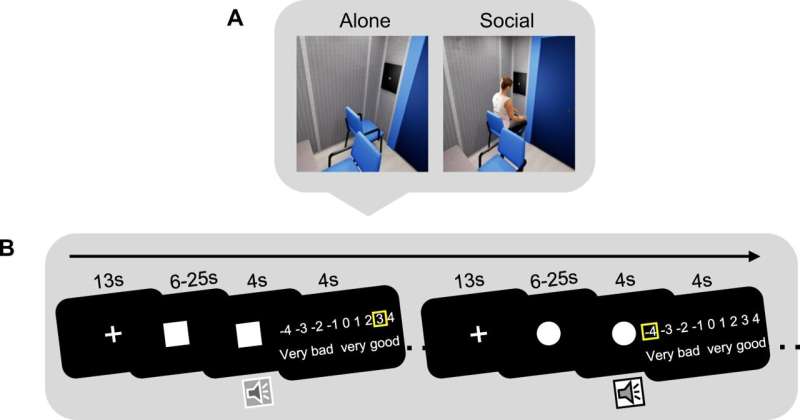#Could a virtual companion soothe social anxiety?

“#Could a virtual companion soothe social anxiety?”

A lot of people feel less anxious in a frightening situation if they don’t have to face it alone. But what if these people suffer from social anxiety—a disorder characterized by fears of embarrassing themselves in social situations? Does the soothing effect of a companion then have the contrary effect? Could a virtual companion solve the problem in such cases? And how do men and women differ in how they respond to such situations?
A team of scientists from the University of Würzburg, the Würzburg University Hospital and Zhengzhou University (China) has looked into these questions in a current study which involved scholars from the fields of neuroscience, psychology and computer science. It was led by Grit Hein, Professor of Translational Social Neuroscience at the Department of Psychiatry, Psychosomatics and Psychotherapy at the Würzburg University Hospital. The team has now published its research results in the journal Translational Psychiatry.
“In a nutshell, we have shown that anxiety can also be reduced by the ‘presence’ of a virtual person, especially in socially anxious women. And women in general seem to benefit more from social presence,” Hein summarizes the key findings of the study. She believes that this insight might have practical significance.
A study of more than 200 participants
208 men and women participated in the study. They were all exposed to fear-inducing sounds alternating with neutral ones—either in the company of another person or alone. Women had female companions, men had male companions. The researchers determined the level of the participants’ anxiety response through changes in skin conductance. Moreover, the participants had to rate the sounds on a scale.
But the series of experiments differed in one key aspect: One group had a real person at their side during the experiment whereas the second group completed the task in a virtual reality—accompanied by an avatar that was an image of the real companion.
Social support as a stress buffer
“Earlier experiments have shown that the presence of a third party can significantly reduce fear responses. In such situations, social support thus has a stress-buffering effect,” Grit Hein explains. But not all people are equally sociable. In some, the presence of others might actually trigger apprehension or anxiety. They fear that their companion might notice their anxious responses, such as trembling, flushing or sweating, causing them stress in the first place. It has been unclear so far whether an avatar is also capable of triggering such a response.
The results of the Würzburg study have now provided clarity in this regard. They show:
- Women respond much more strongly to fear-inducing sounds than men.
- The presence of another person reduces anxiety especially in women. This is especially true for women without social anxiety disorder.
- The presence of a virtual person also reduces the anxiety response in women—regardless of the level of social anxiety they experience. So a virtual agent may increase feelings of safety in women suffering from social anxiety disorder.
- Social anxiety does not have a comparable effect on men.
“Our findings provide new insights into the individual differences that influence the social modulation of the autonomic human anxiety responses,” the authors conclude in their study. In future studies, the researchers aim to study long-term effects and replicate the findings in real life.
In addition, they would like future studies to systematically explore the effect of the gender of the present person. This would also allow scientifically sound evidence to be provided as to how men respond when they have a woman at their side in fear-inducing situations and vice versa.
Social anxiety disorder, fear and anxiety lead to avoidance
Yanyan Qi et al, Social buffering of human fear is shaped by gender, social concern, and the presence of real vs virtual agents, Translational Psychiatry (2021). DOI: 10.1038/s41398-021-01761-5
Citation:
Could a virtual companion soothe social anxiety? (2022, January 18)
retrieved 18 January 2022
from https://medicalxpress.com/news/2022-01-virtual-companion-social-anxiety.html
This document is subject to copyright. Apart from any fair dealing for the purpose of private study or research, no
part may be reproduced without the written permission. The content is provided for information purposes only.
If you liked the article, do not forget to share it with your friends. Follow us on Google News too, click on the star and choose us from your favorites.
For forums sites go to Forum.BuradaBiliyorum.Com
If you want to read more Like this articles, you can visit our Science category.



